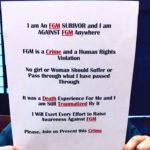Meeting FGM Survivors for the First Time Was My Cursed Blessing
Note: The following was written anonymously by a survivor. Her story highlights the power of storytelling and how it helps break the isolation that many survivors experience in having undergone FGM/C and dealing with the trauma afterwards.
Even now, despite my brain trying to convince me it was a good idea to attend a conference on FGM and Mental Health, I cannot emotionally explain what really happened there.
The conference convened FGM survivors, human rights advocates, therapists, and policymakers. Almost two weeks later, I started to have strong flashbacks of the terrible experience I underwent with FGM in my home country, Egypt. I have mixed feelings of love, support, and pain for having attended that conference.
My journey started in Egypt, where my rights as a human being were violated without my consent. I was bleeding and almost died, having been operated upon twice. Even now, I cannot easily write these words. You may wish to read my full story published here.
The experience of meeting with other survivors from India and other countries was something I strongly needed. It brought me face-to-face with the many answers to my many questions regarding why I experienced so much anxiety, sadness, depression, panic, and fear after my cutting. I wanted to know how other survivors had dealt with their FGM especially those who spoke up about it publicly. I am relatively new to openly talking about it. I still feel as if I am climbing a mountain when trying to share or speak about it. It was difficult to hear their experiences, but has helped me feel I am not alone. I saw how powerful the pain of this experience can be. But I was inspired by the courage of what we are determined to do: to speak about FGM openly and to try to prevent it from happening to other girls with whatever it will take.
That meeting was the first time I met and talked with other survivors from different countries, such as the United Kingdom, Gambia, India, and the United States. I felt happy that there was a comfort zone for me, knowing that others understood what I had gone through. Seeing all those women in that room encouraged me to declare amongst the group of almost 40 that I too am an FGM SURVIVOR. I knew that these women would not shame me and I did not need to fear being labeled, judged, or threatened for publicly admitting I was a survivor.
My heart was pounding and my breath was short, as if I had climbed a mountain. I thought I was ok during the 8-hour meeting, yet I collapsed and burst into tears at the end. I cannot tell you precisely why, but I thought about how it is unfair that our bodies and souls are violated with this harmful crime. Most of the time I feel sad that I had to go through these painful thoughts, feelings, and flashbacks to the operation room and after. It feels like I am being re-traumatized when something happens to trigger the original trauma of FGM.
I beg every mom and dad to see their daughters as beautiful souls who do not need to be cut to be pure. I am Muslim, and I can say it strongly, clearly, and angrily: Do not make it religious because it is not. My body was not supposed to be violated in this severe way, nor was my soul. Yet, both happened. But I am comforted in knowing that there are others I can talk to who understand my pain.
FGM is a crime and more work needs to be done with healthcare professionals, as well as policy makers. Girls must be protected from being cut and survivors should be supported with the needed assistance to help them heal.


